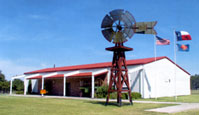|
July 17, 2011
WOLF CREEK HERITAGE MUSEUM NOTES by Virginia Scott MUSEUM HAPPENINGS A very busy week with a lot of visitors. The core group is progressing well with the photograph project and the archive room is filling up with albums nicely labeled and cataloged. It is going to be exciting researching our archives for museum exhibits, newsletters,etc. The Lipscomb County Historical Commission met on Thursday afternoon and had a busy agenda. The Commission is composed of representatives from each of our five towns and oversees the historical projects for the commission and the museum. The meetings are held quarterly and are open to public. Minutes are on file at the museum. The newsletter was delayed due to museum activities but will be going out this week. I am trying to edit our mailing list so if you don't receive the newsletter and want to please call to see if you are a member. Only members will be receiving the newsletter. If our column doesn't appear in the newspaper that you are use to seeing us in this summer, it is because they are taking vacation at different times and their deadlines change from Monday and I only work only Monday and Tuesday so I don't meet their Friday deadlines. Sorry but things will return to normal when we all have a break. Next Week on Saturday, July 30 at p.m. till p.m. we are hosting a donation tea to raise funds for the museum. Please call and RSVP and join us for a afternoon of fun and fellowship. The program for the tea will be Dolores Duke Cross who will present "Grandmother's Legacy". This is the story of J.B. and Mary Margaret Webb Turner coming to Texas and living in Lipscomb Area. On display will be many personal items of Mrs. Turner. The Turner family children were Glen,Dan, Dulcie, Opal, and William (Bill). HISTORICAL MUSINGS As the Panhandle started growing with new settlers and multiple land owners, the question of who owned the grass became an issue. Under the common law, which is the law, except where the state legislature specially does away with it, cattle are commoners, or in other words they are allowed to run at large upon all commons, or unenclosed lands. In a few states, and especially so in Kansas, the state legislature changed the common law and made a law prohibiting the running at large of cattle, or in other words it is call a "herd law". The "herd laws" were passed to protect farmers from cattle destroying their crops. Under these laws, owners of cattle had to keep his stock from the crops of other people or pay damages and anyone finding stock in his might take it up and hold it until the damages were paid. In the Panhandle Interstate in 1887, the editors wrote frequent articles about watching the settlers for fear of an influx of the "herd Law" people from Kansas. "You can count on us every time when it comes to fighting a herd law man from Kansas" In a later editorial addressing who owns the grass, they point out that Texas has "common law" with free range. He makes the point that a man who desires to cultivate land in Panhandle must make up his mind to fence against cattle running at large. We think the man who owns cattle and desires them to run at large should make arrangements to purchase his neighbor's grass, paying for it what it is worth. This would pay for the fence protecting his crop. Therefore, providing peace and prosperity. This issue was one of the major issues that cattlemen and farmers had to negotiate in the settling of our area. |
 |
© 2006 - 2025 Wolf Creek Heritage Museum
All Rights Reserved |


